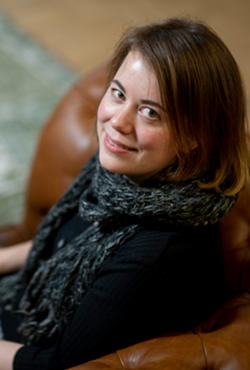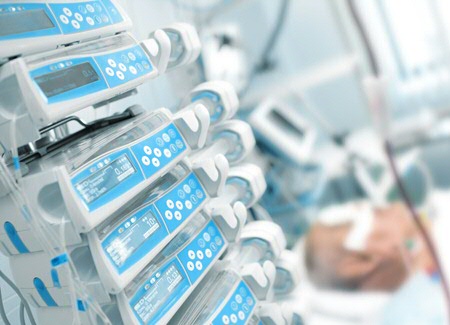COVID-19 once again proves the importance of ICU cafés

The dates had been marked for a long time in the calendar of PhD student Lise Beumeler. She had planned three ICU cafés together with staff members of the aftercare outpatient clinic at the MCL. Due to COVID-19, there were zero. Still, she was not discouraged by this. In fact, this also taught her something.
In her position at the University of Groningen/Campus Fryslân, Beumeler is conducting research at the Medical Center Leeuwarden (MCL) into the recovery of patients who were admitted to an intensive care unit (ICU). When these patients return home, they often still have physical and psychological symptoms as a result of muscle weakness, loss of control and anxiety. As part of her research, Beumeler organized three ICU cafés together with the hospital. In these meetings, former patients would have had the opportunity to talk about their experiences and a specialist would have provided information on life after intensive care. Currently, medical care pays much attention to getting better but not enough attention to the period after intensive care.
Formula for success
ICU cafés are a relatively new phenomenon in the Netherlands. The first one was held two years ago, in Tilburg. From the experiences in other cities, Beumeler knows that patients are very happy with the opportunity to connect with peers. There was plenty of interest in these cafés in Leeuwarden as well. Around 30 people had registered for each in-person session — a rather large number, considering that these are uncertain times due to COVID-19 and the target group consists of at-risk people. Beumeler: ‘Former ICU patients often have symptoms and are more scared to become ill again than the average person. But all these people found these sessions important enough to put their fear aside.’
Bringing the entire family along
Beumeler is convinced that the target group in particular was interested. ‘Yes, we didn’t want to make this into a social gathering for doctors and nurses. We attracted former patients for sure, often together with their partners. The meetings would also have been informative for them, to learn how to better understand the situations and behaviours of their partners. There was even someone who wanted to bring their entire family along. This shows how much impact being admitted to the IC can have on someone’s home situation.’

Effects of COVID-19
Of course, the coronavirus pandemic has affected her research, comments Beumeler. But not just negatively. ‘Naturally, there is a negative, practical side. I can’t take measurements at the hospital and I have to invite less patients to the aftercare outpatient clinic. Many also don’t want to visit, they’d rather avoid the hospital.’ But it turns out that there is a positive side as well: the distance makes contact more valuable. Beumeler: ‘For my research, I regularly contact 81 former patients. Now that I don’t see them anymore, I call them more often. We discuss their situations, their fears and limitations during COVID-19. They are very happy with that, because a lot of other healthcare contact, such as with their GP or their physiotherapist, has been or is being cancelled.
Stimulus for more action
COVID-19 has highlighted the importance of aftercare for Beumeler and her colleagues even more. ‘Aftercare for ICU patients is currently rather limited. Former patients of the MCL are included in the regular programme of, for example, a follow-up appointment at the aftercare outpatient clinic. But some former patients of the MCL live in the south of the country. I don’t expect them to drive up to Leeuwarden for such a talk. They fall between the cracks. It’s now even more important to get on with our planned nutrition and exercise programme. Luckily, health insurers are starting to pay more attention to these problems as well.’
Sincere attention
Who knows exactly when another ICU café will be able to be held. But according to Beumeler, all is not lost. Because, if there’s anything that she’s learned from these cancelled meetings, it’s that there is a lot of demand for them. ‘The ICU nurses had been wanting something like this for a long time. They were happy that we could set it up together as part of my research. It is wonderful to see that insights and knowledge from the workplace dovetail so well with the needs of the patient. Beautiful things can arise from sincere attention.’
Text: Eelco Salverda, Communication UG
| Last modified: | 20 October 2020 09.38 a.m. |
More news
-
27 May 2024
Symposium 'From tensions to opportunities'
On 20 June 2024 a symposium will take place around the question: 'How to work effectively and meaningfully with internationalisation and diversity in study programs and disciplines?'. The symposium builds on the PhD research by Franka van den Hende...
-
22 May 2024
UG awards various prizes during the Ceremony of Merits
The UG awarded various prizes to excellent researchers and students during the Ceremony of Merits on 21 May 2024. The Wierenga-Rengerink PhD Award for the best UG dissertation was awarded to Dr Bram van Vulpen (Campus Fryslân). The Gratama Science...
-
02 April 2024
Is more data always better?
Xiaoyao Han researches the added value of Big Data and explores how the accumulation of data enriches our scientific understanding
